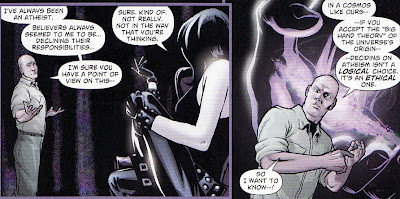Monday, November 1, 2010
Review: Action Comics #894
Action Comics #894 continued Lex Luthor's journey around the darker corners of the DCU as he tries to grasp some Black Lantern energy for himself. What has been interesting about this arc has been the varied tones of each issue. Last issue with Gorilla Grodd was downright comical. It feels as though one of the underlying themes of this whole arc has been an in-depth analysis of Luthor himself. And maybe the variety of feelings we have seen in each issue has been a way to show just how complex Lex is.
Now this issue has been highly highly publicized for guest starring Death from Neil Gaiman's Sandman. Her presence must be considered a boon for sales on the book as my local comic book store had a glut of this book on the shelves, taking up two slots on the racks. And writer Paul Cornell made sure he let everyone know that Gaiman was on board with the story idea and even approved of the dialogue.
I will freely admit ... and I am sure that I will suffer some slings and arrows here ... that I never really enjoyed Sandman that much. I never quite understood what all the fuss was about. And yet, I slavishly collected it wondering if maybe I was missing the point ... that maybe one day a bolt of enlightenment would shine on me and I would recognize Gaiman for the outright genius that he is. But the truth is I was much more interested in reading and rereading Shade The Changing Man, Doom Patrol, and Animal Man at that time. Sandman is in my long boxes, but I can't remember the last time I pulled them out and reread them. That said, I did enjoy Death as a character and did get her mini-series. And those I have occasionally thumbed through again.
Would the presence of Death elevate this book? And what would be the tone of this issue of Action?
Last issue, Lex was shot through the chest and fell from an airplane, purportedly to his death. And then, she appeared.
At first Lex isn't a believer. He thinks that maybe the body at his feet isn't him but some sort of android or replicant. But Death is able to convince him that she is who she says she is.
Throughout the book, Death certainly has some witty things to say. She has always been a charming character. She has, ironically, a sort of joie de vivre about her. Here I thought it was great that she said that while she didn't have a scythe or skis, she was Death. I thought it was a nice reference to the more classic Grim Reaper and the Kirby Black Racer concept of death incarnate.
This issue really is just a long conversation, reviewing Luthor's concepts about life, death, and the afterlife. Part of me always wonders about how certain issues will progress a story arc. I don't know exactly where this storyline is going. In the end, will an analysis of Lex's thoughts about these concepts be so crucial that they needed their own issue? Or will this simply have been a way to shoe-horn a proven guest star into the title? I am not saying that this isn't interesting ... it is.
The first part of Death's discussion with Luthor is to show him his life. One thing I thought was fascinating was that initially Luthor doesn't want to see his life flash before his eyes. Is he ashamed of his life? Does he not want to see the things he has done that he knows was wrong? Or does he always just want to look forward.
Anyways, his life is dominated by Superman and violence ... or as Death says it is filled with 'lots of people being clever.'
And I also really liked Death's response to Blackest Night. Luthor keeps hammering home the point that people always come back from being dead and references Blackest Night. She noticed it! She thought people looked like they were having a good time! That is clearly how someone in the Endless would look at the horrific events of Blackest Night. She has a distance from the actual events.
And she isn't a super-villain so he should stop talking to her like she is. Wonderful.
Once Luthor realizes that this is happening, he tries with all his might to figure out which string to pull to have Death bring him back.
First he tries anger. Then he tries sympathy. She recognizes these efforts ... she has heard them all before. But they don't change the outcome. He is going to move on. But to where?
Death brings Lex into a quiet parlor to talk about his ideas of the afterlife.
As with most things, Lex has some pretty ingrained beliefs. He doesn't think anyone has the right to judge him. No one can be objective. As a result, he considers his atheism an ethical choice. I love how he talks about Krona's actions as the 'big hand theory' of the universe ... not the 'big bang'.
Death continues to humor his rantings, wondering if Lex could just say he was sorry for all the things he has done. Of course, he has justifications for all his actions ... why would he apologize? And to whom? That is all classic Luthor. He doesn't think he's the bad guy. He thinks he's the good guy.
It's clear that Lex isn't quite grasping whatever she is trying to teach him here. So she decides to show him some of the options of the afterlife.
First, there is a hedonistic paradise. Even Death is intrigued by the inclusion of what I assume is the Lois-bot. When Lex calls the events he sees before him as mere diversions and not what he lives for, Death stammers a bit. She sees someone doing something with something that grabs her enough to be somewhat surprised that Lex would turn it down.
But I can't imagine that the backbone of Lex is hedonism so it made sense for him to reject that.
And how about lovely bliss instead of sweaty passion?
I love Luthor's response. He couldn't enjoy it because he'd be wondering what the catch was. He really has a pessimism about him. He really has trust issues.
And he is never going to bow to ... to apologize to ... to anyone.
In what has to be a sign of bravery or insanity or both, he tells Death he is done with her. She should send him wherever she is going to ... he'll figure it out from there.
Amazingly, Death tells him that, in fact, he isn't dead and this was a preliminary check on something. Suddenly Luthor is back in his body, on his jet being tended to.
I suppose that this is going to end up being crucial to the end of the book. Will Luthor somehow gain power over life and death and hearken back to this conversation before he wields it? I can only hope.
You know, in Alan Moore's Swamp Thing I knew that his conversation with the Parliament of Trees, that their cryptic 'Look to the Soil' comments would eventually have a payoff. I had faith that Moore wasn't simply spinning his wheels. I don't have that same sense here. I hope there will be a payoff.
Even Lex is wondering. What is going to happen that prompted Death to check in?
Of course, I am wondering how he survived a sniper shot to the chest and fall of hundreds of feet. Will that be explained?
The book ends with a decent hook. We see Vandal Savage in the past, building a city around some of the Black energy globes. We know these globes transcend time. How will this ancient city impact Lex?
So what about this issue?
Well I enjoyed this conversation between Death and Lex. It gave some insight into Lex's personality and beliefs. It certainly shows how ingrained his ideas are. He is even willing to stand up to Death herself before compromising.
But in some ways, I also thought this was much ado about nothing. Did we really learn anything new about Lex? Was it shocking to learn he is an atheist? Was this trip through Luthor's mind really necessary? Or was this Paul Cornell being clever? Was this just a stunt? If there is an eventual payoff to this encounter, I will certainly rethink this issue.
Pete Wood's art continues to shine here. I like that his Death looks like a normal person and not as ultra-petite/emaciated like others have portrayed her. His stuff is always solid.
Overall grade: B
Subscribe to:
Post Comments (Atom)













1 comment:
DC has done the whole 'clever people don't believe in god' too much with Mister Terrific but I liked what Lex said about the ethical position rather than the logical one. It never made sense that a man like Mr T. would not believe in God(s) when he is surrounded by extensions of their power. He may look at them as just other life forms as much as the aliens he interacts with daily but there is no doubt they fulfill what it means to be a god.
Post a Comment